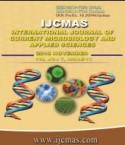


 National Academy of Agricultural Sciences (NAAS)
National Academy of Agricultural Sciences (NAAS)

|
PRINT ISSN : 2319-7692
Online ISSN : 2319-7706 Issues : 12 per year Publisher : Excellent Publishers Email : editorijcmas@gmail.com / submit@ijcmas.com Editor-in-chief: Dr.M.Prakash Index Copernicus ICV 2018: 95.39 NAAS RATING 2020: 5.38 |
The Study was carried out on Pigeonpea (Cajanus cajan) with drip cum fertigation in transplanted Pigeonpeain Vertisols (Black-cotton soils) at Agricultural Research Station, Tandur, Vikarabad District, Telangana state, India. The experiment was conducted in Split-plot design with three replications comprised of Irrigation levels (four I1: 0.6, I2: 0.8: I3:1.0 and I4:1.2 IW/CPE ratio as main plots based on Pan Evaporation and Fertility levels three (F1: 75 % RDF, F2: 100 % RDF and F3: 125% RDF) as sub-plots. The test variety was Asha ICPL 87119.Under drip cum fertigation system of Transplanted Pigeonpea (variety ICPL 87119) irrigation with 120% of daily pan evaporation recorded significantly highest seed yield (3014 kg/ha) which was supported by the Harvest index (24.4), number of pods per plant (1020), Leaf area index LAI (4.37), radiation use efficiency (0.26 g/MJ) and water use efficiency (4.33). Highest seed yields with 125% RDF through fertigation was because of higher photosynthetic activity which resulted in better development of pods (1006) 100 seed weight (10.2) and finally the water use efficiency (7.80 kg/ha/mm) In this context, micro irrigation could play a key role in higher productivity and increased water use efficiency (WUE) besides fulfilling sustainability mandates with economy in use.
 |
 |
 |
 |
 |